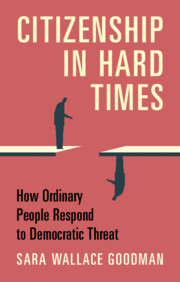Book contents
- Citizenship in Hard Times
- Citizenship in Hard Times
- Copyright page
- Dedication
- Contents
- Figures
- Tables
- Acknowledgments
- 1 Introduction
- 2 Citizenship and Democratic Instability
- 3 Measuring Citizenship Norms
- 4 Patterns of Partisan Citizenship
- 5 The Threat of Polarization
- 6 Foreign Interference in Elections
- 7 Conclusion
- Book part
- References
- Index
5 - The Threat of Polarization
Published online by Cambridge University Press: 22 January 2022
- Citizenship in Hard Times
- Citizenship in Hard Times
- Copyright page
- Dedication
- Contents
- Figures
- Tables
- Acknowledgments
- 1 Introduction
- 2 Citizenship and Democratic Instability
- 3 Measuring Citizenship Norms
- 4 Patterns of Partisan Citizenship
- 5 The Threat of Polarization
- 6 Foreign Interference in Elections
- 7 Conclusion
- Book part
- References
- Index
Summary
Do citizens think polarization is a threat? Does it impact how they define good citizenship? Chapter 5 presents the first vignette survey experiment on the effects of information on polarization as a threat on citizenship norms. We find citizens who receive the polarization treatment are significantly more vigilant (“watches the government”) than the control group in all three cases. A disaggregated analysis by partisanship reveals that the effects of the polarization treatment differ between the left and right. In highly polarized, winner-take-all contexts, polarization may be framed as a shared problem, but only partisan left challengers mobilize to repair it. There are differences in how they respond across cases, but we only see significant changes to citizenship norms within this subset of respondents.
- Type
- Chapter
- Information
- Citizenship in Hard TimesHow Ordinary People Respond to Democratic Threat, pp. 112 - 144Publisher: Cambridge University PressPrint publication year: 2022

